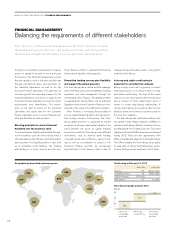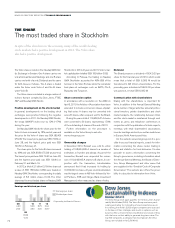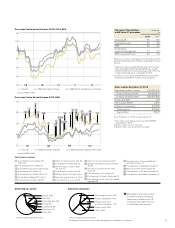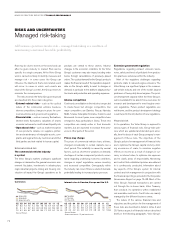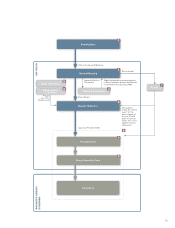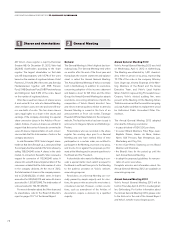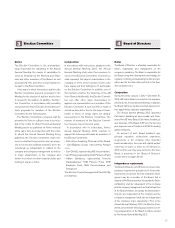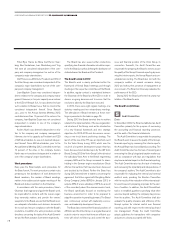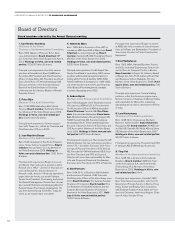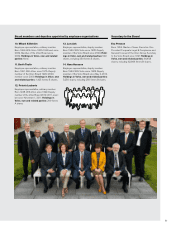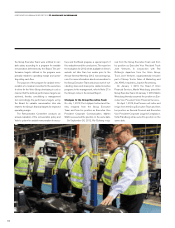Volvo 2012 Annual Report Download - page 82
Download and view the complete annual report
Please find page 82 of the 2012 Volvo annual report below. You can navigate through the pages in the report by either clicking on the pages listed below, or by using the keyword search tool below to find specific information within the annual report.
ness and financial position of the Volvo Group. In
connection therewith, the Audit Committee was
responsible for preparing the Board’s work to assure
the quality of the Group’s financial reporting by revie-
wing the interim reports, the Annual Report and con-
solidated accounting. The Board also met with the
company’s auditors at several occasions during
2012 and without the presence of management at
one occasion. The Board continuously evaluates the
performance of the CEO.
During 2012 the Board performed its yearly eva-
lutation of the Board’s work.
The Board’s committees
5
Audit Committee
Duties
In December 2002, the Board established an Audit
Committee primarily for the purpose of overseeing
the accounting and financial reporting processes
and the audit of the financial statements.
The Audit Committee is responsible for preparing
the Board’s work to assure the quality of the Group’s
financial reporting by reviewing the interim reports,
the Annual Report and consolidated accounting. The
Audit Committee also has the task of reviewing and
overseeing the Group’s legal and taxation matters as
well as compliance with laws and regulations that
may have a material impact on the financial reporting.
The Audit Committee also has the task of reviewing
and overseeing the impartiality and independence of
the company’s auditors. The Audit Committee is also
responsible for evaluating the internal and external
auditors’ work, providing the Election Committee
with the results of the evaluation of the external audi-
tors and to assist in preparing proposals for the elec-
tion of auditors. In addition, the Audit Committee’s
task is to establish guidelines specifying what other
services, beyond auditing, the company may procure
from the auditors. The Audit Committee shall also
evaluate the quality, relevance and efficiency of the
Group’s system for internal control over financial
reporting, and with respect to the internal audit and
risk management. Finally, the Audit Committee
adopts guide lines for transactions with companies
and persons closely associated with Volvo.
Peter Bijur, Hanne de Mora, Carl-Henric Svan-
berg, Ravi Venkatesan, Lars Westerberg and Ying
Yeh were all considered independent of the com-
pany and company management as well as of the
company’s major shareholders.
Olof Persson, as AB Volvo’s President and CEO of
the Volvo Group, was considered independent of the
company’s major shareholders but not of the com-
pany and company management.
Jean-Baptiste Duzan was considered indepen-
dent in relation to the company and company mana-
gement. However, in his prior capacity as an advisor
to the CEO of Renault S.A., he was deemed to have
such a relation to Renault s.a.s. that he could not be
considered independent thereof. Since Renault
s.a.s., prior to the Annual General Meeting 2012,
controlled more than 10 percent of the votes in the
company, Jean-Baptiste Duzan was not considered
independent in relation to one of the company’s
major shareholders.
Anders Nyrén was deemed independent in rela-
tion to the company and company management.
However, due to his capacity as President and CEO
of AB Industrivärden, he was not deem ed indepen-
dent thereof. Since AB Industri värden, prior to the
Annual General Meeting 2012, controlled more than
10 percent of the votes in the company, Anders
Nyrén was not considered independent in relation to
one of the company’s major shareholders.
Work procedures
Every year, the Board adopts work procedures for
the Board’s work. The work procedures contain rules
pertaining to the distribution of work between the
Board members, the number of Board meetings,
matters to be addressed at regular meetings of the
Board and duties incumbent on the Chairman.
In accordance with the work procedures, Volvo’s
Chairman shall organize and guide the Board’s work,
be responsible for contacts with the owners regar-
ding ownership matters and provide the owners’
viewpoints to the Board, ensure that the Board recei-
ves adequate information and decision documents
for its work and ensure compliance with the Board’s
resolutions. In addition, the work procedures contain
directives concerning the tasks of the Audit Commit-
tee and the Remuneration Committee respectively.
The Board has also issued written instructions
specifying how financial information should be repor-
ted to the Board, as well as defining the distribution of
duties between the Board and the President.
The Board’s work in 2012
The Board’s work is mainly performed within the
framework of formal Board meetings and through
meetings in the respective committees of the Board.
In addition, regular contact is maintained between
the Chairman of the Board and the CEO in order to
discuss on-going business and to ensure that the
resolutions taken by the Board are executed.
In 2012, there were eight regular meetings, one
statutory meeting and two extraordinary meetings.
The attendance of Board members at these mee-
tings is presented in the table on page 79.
During 2012 the Board devoted time to matters
related to the implementation of the new organizatio-
nal structure of the Group, such as the introduction
of a new financial framework and new strategic
objectives for 2013–2015 and discussions concer-
ning a new truck brand positioning strategy. The
launch of the new Volvo FH was an important event
for the Volvo Group during 2012, which was the
result of a long-term development project that has
been discussed and decided upon by the AB Volvo
Board. During 2012 the Volvo Group further divested
the subsidiary Volvo Aero to the British engineering
company GKN and the Group increased its share-
holding in the German engine manufacturer Deutz
AG, two transactions that have also been discussed
and decided by the Board. Further the Board has
during 2012 devoted time to matters concerning the
agreement that Volvo signed with Dongfeng Motor
Group Company Limited (DFG) in January 2013, to
acquire 45% of a new subsidiary of DFG. As a result
of the uncertainty about the macroeconomic trend,
the Board specifically focused on monitoring the
business environment in order to be prepared to
adapt the operation to prevailing demand. The Board
also continuously worked with leadership succes-
sion- and leadership development issues.
The Board also reviewed the financial positions of
AB Volvo and the Volvo Group on a regular basis and
acted in order to ensure that there are efficient sys-
tems with which to follow-up and control the busi-
78
CORPORATE GOVERNANCE REPORT 2012 CORPORATE GOVERNANCE


